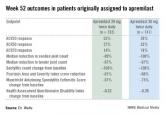Conference Coverage

Apremilast effects sustained at 1 year in psoriatic arthritis
Major finding: ACR 20 response at 1 year was 57%-63% for patients given apremilast.Data source: PALACE 1, a 504-patient, phase III, multicenter,...

Apremilast, an oral phosphodiesterase-4 inhibitor, has been approved for treating adults with active psoriatic arthritis, based on the results of three studies of 1,493 patients, the Food and Drug Administration announced on March 21.
As a postmarketing requirement, the manufacturer will evaluate the effects of exposure to treatment in pregnant women with a pregnancy registry, according to an FDA statement.
In the three studies, the signs and symptoms of psoriatic arthritis improved among patients treated with apremilast, compared with those on placebo. Diarrhea, nausea, and headache were the most common adverse events associated with treatment. Depression was reported more frequently among those treated with apremilast in the studies, according to the FDA.
Results of the phase III studies were reported in 2013 at the American College of Rheumatology annual meeting and at the annual European Congress of Rheumatology.
During treatment, health care professionals are advised to regularly monitor the weight of patients, and "if unexplained or clinically significant weight loss occurs, the weight loss should be evaluated and discontinuation of treatment should be considered," the statement said. Celgene Corporation will market apremilast under the brand name Otezla.

Major finding: ACR 20 response at 1 year was 57%-63% for patients given apremilast.Data source: PALACE 1, a 504-patient, phase III, multicenter,...
Major finding: A total of 33.1% of apremilast patients achieved PASI-75, compared with 5.3% of placebo patients.Data source: A phase III,...

Major finding: After 16 weeks of treatment, the investigational drug apremilast achieved an ACR20 response of 29.2% at 20 mg twice daily as first-...
